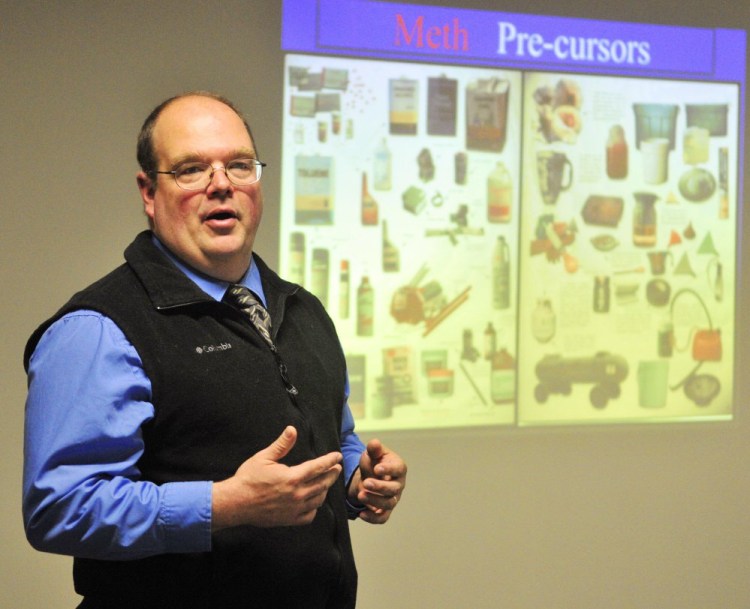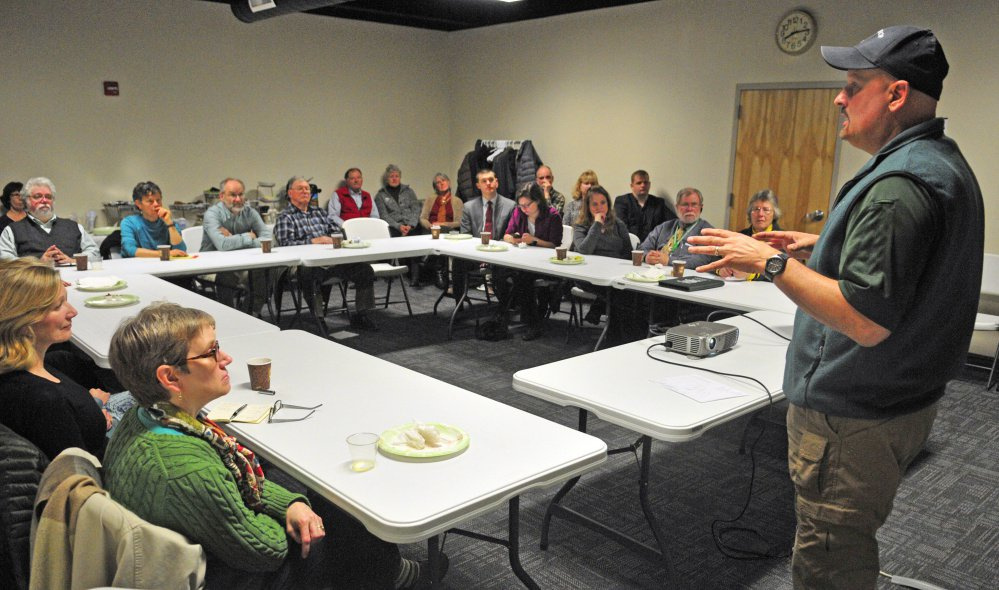WINTHROP — When John Dovinsky was growing up in San Diego, heroin was, by his definition, “a street drug that was only used by junkies and musicians.”
But now, the chief of the local ambulance service said Thursday morning, “heroin is a drug that we’re seeing everywhere. There is no stigma attached to this drug anymore. There is no sociological avenue that heroin doesn’t cross out of anymore. I see people overdose in apartments. I see people overdose in cars. I see people overdose in $750,000 houses.”
Dovinsky was speaking to 25 businesspeople, teachers, lawyers, administrators and local residents who had come to a monthly breakfast hosted by the Winthrop Lakes Region Chamber of Commerce. He was addressing a subject that has become a regular topic at forums across Maine: the opiate criss that has afflicted the state and region.
The Winthrop Ambulance Service serves seven towns in western Kennebec County, all of which are rural or semi-rural, a big contrast to where Dovinsky grew up. But despite the isolation of communities like Monmouth and Mount Vernon from the urban centers where the drug trade has historically been centered, they have still experienced a recent uptick in heroin use.
“In the last 15 months, we have dealt with over 60 overdoses. We have administered Narcan 27 times within the seven communities we cover,” Dovinsky said, referring to the drug that can counteract heroin overdoses. “That’s a lot. That’s a lot. … We were using Narcan just a handful of times seven or eight years ago. All of sudden we’ve got this upswing.”
In the Thursday morning talk, Dovinsky was joined by Chief Ryan Frost and Detective Peter Struck of the Winthrop Police Department, as well as Kennebec County Sheriff Ryan Reardon.
But though the speakers came from varied law enforcement and emergency medicine backgrounds, all agreed that it will take a mix of arrests and treatment options to resolve the ongoing opiate crisis.
Several of the speakers pointed to a lack of affordable and effective drug treatment options. Taken together, their speeches illustrated the way in which a lack of treatment and recovery options is contributing to a variety of ills: more overdoses, drug-addicted babies, burglaries and worse crimes by those trying to feed their habit, and the resulting surge in incarceration.
“Why is a law enforcement officer up here talking about recovery and treatment? Because I’m sick of having (drug users) in my jail,” Reardon said. “All we’re doing is separating families. Most of these people didn’t go into this saying, ‘I want to be an addict.’ ”
Statewide, drug overdose deaths increased by 31 percent in 2015, reaching a new high of 272 fatalities that was fueled by a near doubling of heroin deaths, according to data released last month by the attorney general’s office. There were 107 deaths from heroin, compared to 57 heroin overdoses the previous year.
In 2015, Kennebec County saw a 65 percent increase in overdose deaths from 2014.
“That is a staggering number,” said Frost in his opening remarks. He pointed out that it’s not just opiates, but also other drugs like cocaine and methamphetamine that are abused in Maine.
Winthrop has dealth with a number of overdoses in the last year, but Frost said that none have been fatal and credited the town’s ambulance crews with always responding quickly to such incidents.
No one who spoke downplayed the importance of law enforcement in addressing the drug crisis. Frost said he regularly works with members of the Kennebec County Sheriff’s Office, Maine State Police and Maine Drug Enforcement Agency.
The problem, he said, is that drug use can often lead to property crimes such as burglary and violent crimes such as robbery and aggravated assault. Over the last five years, the department has responded to seven robberies at places such as pharmacies and homes, Frost said. Five definitely involved heroin use and heroin was suspected as a factor in the other two, he said.
Both Struck, the police department’s detective, and Dovinsky, the ambulance chief, urged anyone to contact police if they notice suspicious circumstances, such as used needles by the side of the road or empty boxes of Sudafed – a drug that can be used in the cooking of methamphetamine – in trash bins.
Dovinsky also urged attendees to speak with their lawmakers about creating more treatment options for drug users.
Frost said he would like to create a program that steers drug users who have broken the law directly into treatment programs, such as one the Scarborough Police Department has implemented, but that there is not enough funding available to do so at this point.
Send questions/comments to the editors.




Comments are no longer available on this story